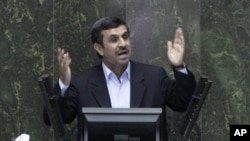Iranian President Mahmoud Ahmadinejad has shrugged off criticism of his record in office during an interrogation by lawmakers who accuse him of economic mismanagement and defying Supreme Leader Ayatollah Ali Khamenei.
The Iranian parliament's questioning of Mr. Ahmadinejad on Wednesday marked the first time that lawmakers had summoned an Iranian president to testify about his policies. Iran's state radio broadcast the hearing live.
Conservative critics of Mr. Ahmadinejad have been emboldened since making big gains in parliamentary elections earlier this month. The results will leave the president, also a conservative, with an even smaller minority of supporters when the assembly is reconstituted in May.
A prominent parliamentary critic of the president, lawmaker Ali Motahari, began the session by reading from a list of 10 questions to Mr. Ahmadinejad.
Motahari demanded explanations for Iran's high inflation rate, the government's failure to finance Tehran's metro rail network, and the president's refusal to appear at work for 11 days last year after the supreme leader overruled his firing of the Iranian intelligence minister.
In an hour-long, sometimes flippant response, Mr. Ahmadinejad said Iran's rising inflation had "nothing to do" with his 2010 decision to scrap government subsidies of food and fuel prices. He also explained his 11-day absence from work by saying friends had told him to relax at home.
Mr. Ahmadinejad's conservative critics say he stayed off the job to protest the supreme leader's reinstatement of the intelligence chief, whom he had fired. They say the incident is one of several in which the president has unacceptably challenged Ayatollah Khamenei's authority.
Rasool Nafisi, a northern Virginia-based Mideast analyst, told VOA that the questions prepared by the lawmakers were not precise enough to challenge the president, enabling him to deflect or dismiss them easily.
Mr. Ahmadinejad closed his remarks by mocking those questions, saying they were written by people who received a "master's degree by pushing a button" and declaring that he could have come up with better ones himself.
Lawmakers critical of the president reacted angrily, telling Iranian media that his comments were evasive and insulting. Some also called for parliament to impeach him.
Nafisi said impeachment is "not going to happen" under current circumstances because it would require the "tacit approval" of Ayatollah Khamenei. He said the supreme leader will not permit more political chaos in the country while he confronts the West in a dispute about the Iranian nuclear program. Western powers accuse Iran of trying to develop nuclear weapons under cover of energy and medical projects, a charge Tehran denies.
| Join the conversation on our social journalism site - Middle East Voices. Follow our Middle East reports on Twitter and discuss them on our Facebook page. |






